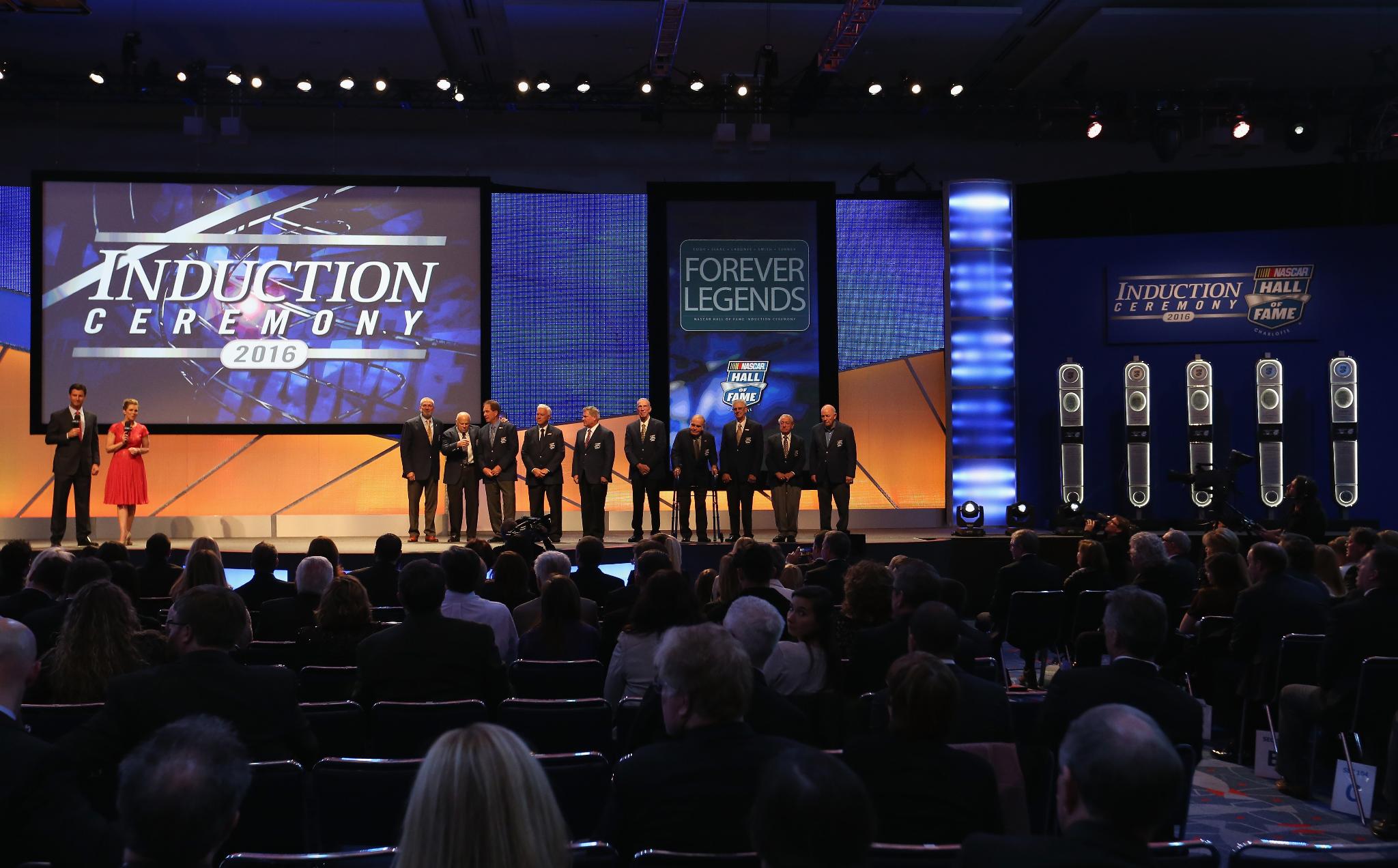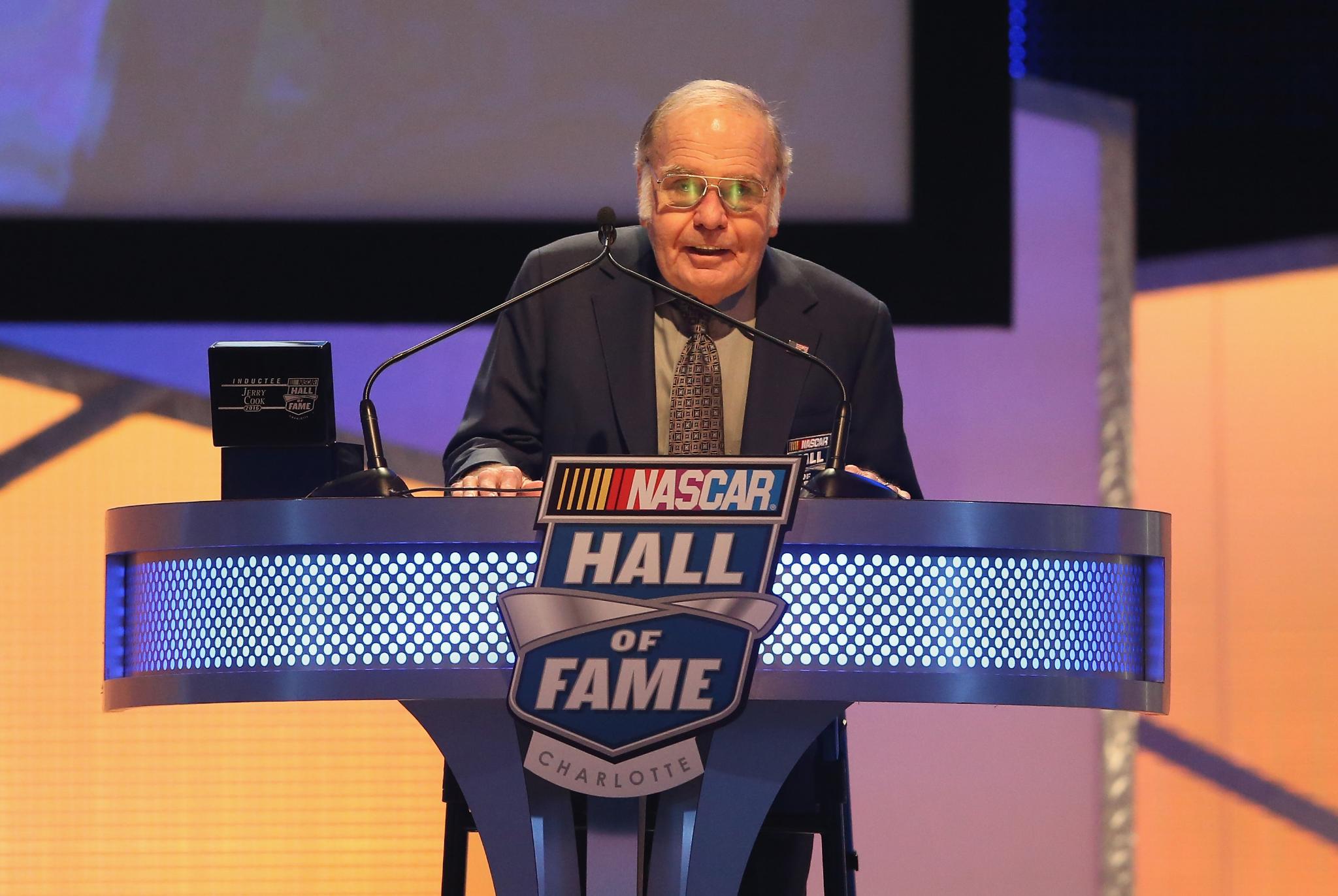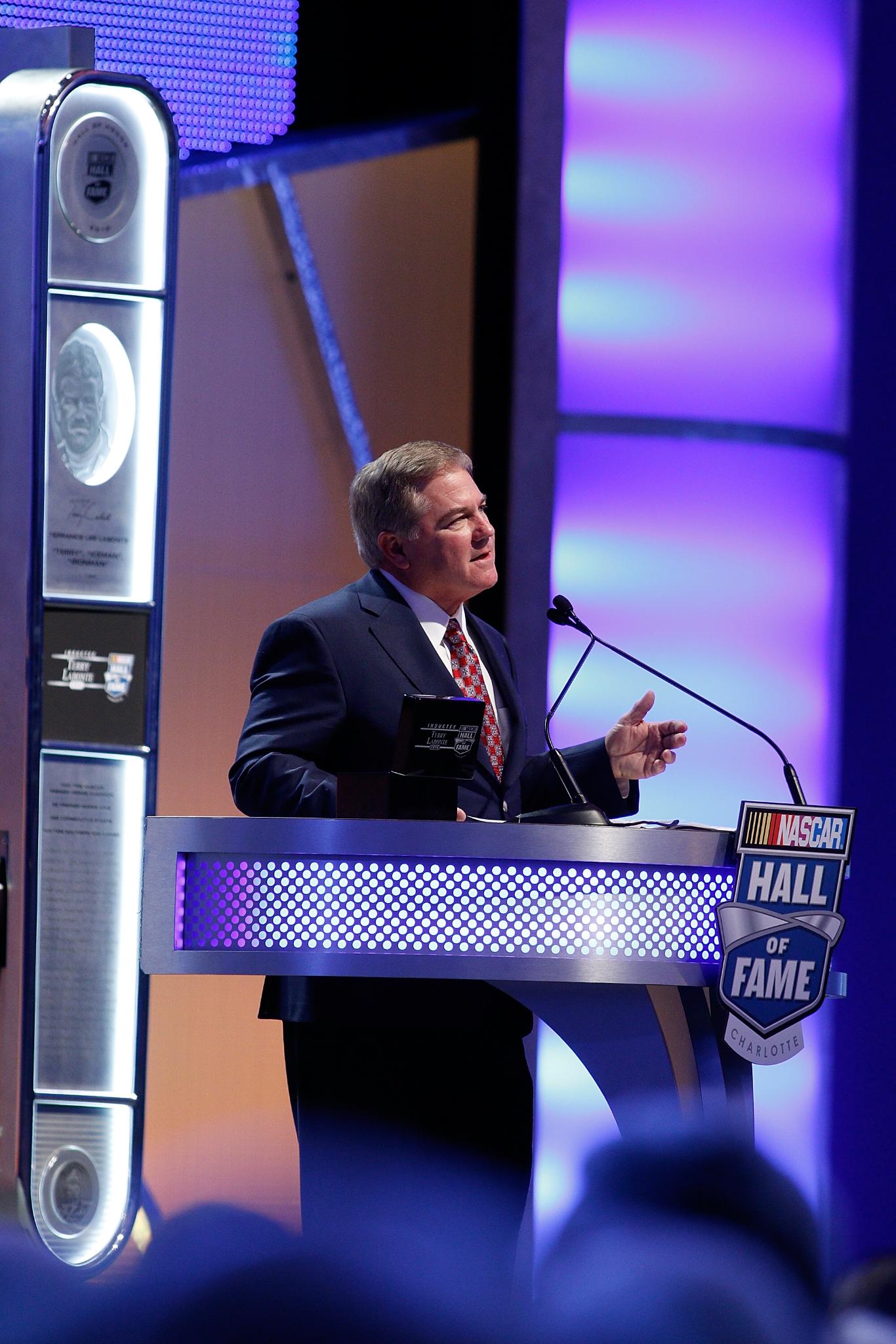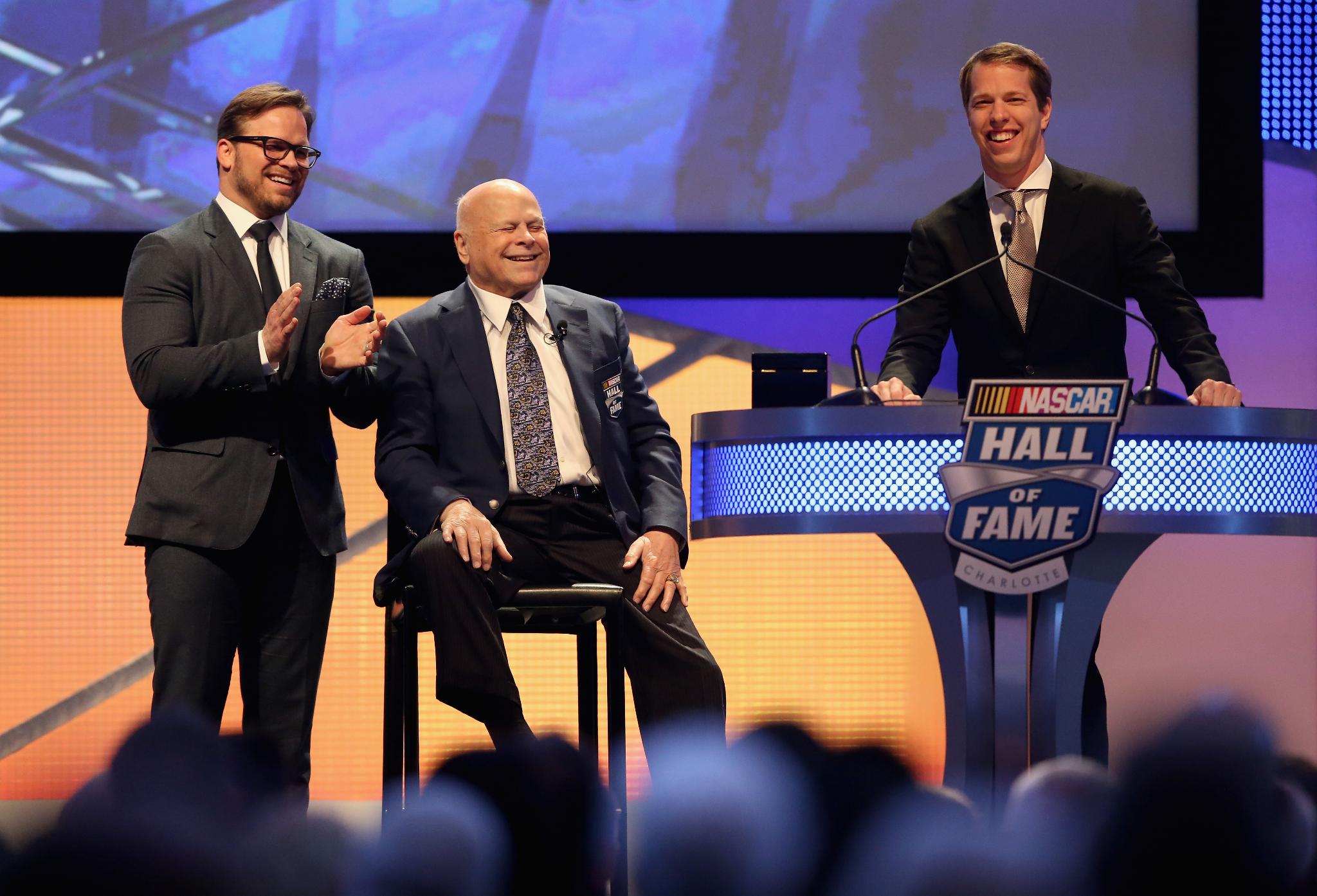NASCAR Hall Of Fame Welcomes Class of 2016
 |
| The NASCAR Hall of Fame Class of 2016 |
| Streeter Lecka/NASCAR via Getty Images |
The NASCAR Hall of Fame inducted their seventh class of honorees on Friday, adding five more iconic racing figures to the already illustrious names already enshrined in NASCAR's glittering museum in downtown Charlotte, NC.
Joining the Hall of Fame in the Class of 2016 includes two-time NASCAR champion Terry Labonte, 1970 NASCAR champion Bobby Isaac, six-time NASCAR modified champion Jerry Cook, as well as driver Curtis Turner and track owner Bruton Smith, who both helped build Charlotte Motor Speedway.
72-year-old New York native Jerry Cook made his name in NASCAR in the modified division, winning seven NASCAR Modified Championships including four straight from 1974 to 1977.
Cook built his first modified when he was 13 but didn't start driving until 1963. From 1971 until his retirement in 1982, he and fellow NASCAR Hall of Famer Richie Evans dominated the modified division, the two combining to win the title every year. Evans would go onto win seven straight titles from 1978-1985.
 |
| Seven-time NASCAR modified champion Jerry Cook |
| Streeter Lecka/NASCAR via Getty Images |
By the time he retired from racing, Cook had amassed 342 wins and 26 poles in over 1,400 career starts. In addition to his seven championships, he also finished second in title hunt six times and third twice.
After his retirement, Cook helped develop the NASCAR Whelen Modified Series and served as series director during the series inaugural year in 1985. He was voted as one of NASCAR's 50 Greatest Drivers in 1998 and inducted into the International Motorsports Hall of Fame in 2009.
"For me, it's always been NASCAR," said Cook. "I've spent my entire life in the greatest sport in the world, and to be honored in this way today, to be here and be inducted into the NASCAR Hall of Fame, along with all the greatest names in the sport, is the pinnacle of my career.
"NASCAR is family, and this place is our house. Thanks for bringing me to our house. Thank you."
North Carolina native Bobby Isaac was inspired to become a race car driver after seeing his first race at Hickory Motor Speedway and got his first start driving there in 1949 at the age of 17.
Isaac won 37 races in his 14-year career, but it was his record number of poles that got most people's attention.
Isaac won 49 poles during his career, ranking him 10th all-time. He still holds the record for the most poles in a season, chalking up 19 pole positions in 1969. In 1970, he won his only NASCAR championship with the legendary Harry Hyde serving as his crew chief, winning 11 races. That year, he also set the record of the fastest lap ever at Talladega Superspeedway of 201.104 mph, a record that stood until 1983.
Isaac also set speed records at the Bonneville Salt Flats in 1971, several of which still stand today. Isaac's last NASCAR start came at the 1976 World 600 at Charlotte Motor Speedway. A year later, he died of a heart attack after collapsing during a late model race at Hickory Motor Speedway. He was just 45 years old.
Isaac's widow, Patsy Isaac, accepted his induction in honor of her late husband.
"Bobby began his racing career at Hickory Speedway in 1949 at the age of 17. He ended his career at Hickory Speedway on August 13, 1977," said Isaac. "He died at the age of 45 doing what he loved to do, but he died far too soon. Bobby would have been so proud of this honor."
 |
| Two-time NASCAR Cup Champ Terry Labonte |
| Bob Leverone/NASCAR via Getty Images |
Former two-time champion Terry Labonte holds the distinction of the longest gap between championships for his two Winston Cup titles – scoring his first in 1984 and his second 12 years later in 1996. His younger brother Bobby won the 2000 cup title.
A native of Corpus Christi, Texas, Labonte was known as NASCAR's "Iron Man", with 655 consecutive starts from 1979 to 2000. In his 37-year career, he's tallied 22 victories in 890 starts, including his last victory 2003 on the Southern 500 at Darlington. He made his last start on October 17, 2014 at Talladega.
"You know, I got to do a lot of cool things, got to go a lot of places, and be introduced as a to-time NASCAR champion," said Labonte. "But I'll tell you what: It's going to be a whole lot better introduced as a NASCAR Hall of Famer.
"I'll tell you, it's not everybody gets to do this and race in this series, much less get to do it with your brother, and I'll tell you what, we had some great years we raced together. We have some memories that will last a lifetime, and I love you too, buddy."
Before he helped build Charlotte Motor Speedway and before he promoted his first race, Ollen Bruton Smith was a race car driver. He bought his first race car at the age of 17, but his mom made him quit. Soon afterwards, the owners of a small dirt track in Midland, NC talked him into promoting races at the track, and Smith became a full tie promoter.
After nearly going broke promoting races at small tracks around the area, Smith saw the need for a premiere motorsports facility in the Charlotte area, and decided to build a speedway.
 |
| Bruton Smith along with his son, Marcus (left) and Brad Keselowski (right) |
| Streeter Lecka/NASCAR via Getty Images |
With backing from a wealthy brother-in-law and driver Curtis Turner, Smith helped build Charlotte Motor Speedway on a tract of land in Cabarrus county, and the speedway was born. The track opened in 1959 and hosted its first race – the World 600 – on June 19, 1960.
Unfortunately, within two years, the speedway was bankrupt and Smith was out of the picture. He moved to Illinois and began a successful business venture in automobile dealerships.
Over the next 10 years, Smith began buying up shares of stock in the speedway before becoming majority shareholder in 1975. Smith then hired H.A. "Humpy" Wheeler as general manager and together the two of them began building the speedway into the
In 1994, Smith incorporated Speedway Motorsports, Inc., and took the company public in 1995 as the first motorsports company to be traded on the New York Stock Exchange. Today, the company owns nine motorsports facilities, including racetracks in Atlanta, Bristol, Las Vegas, Kentucky and New Hampshire. Smith also owns hundreds of auto dealerships across the US.
"I appreciate you all coming. I hope you have a great season, a great racing season," Smith said. "I'm delighted and I'm glad to be a part of the (Hall of Fame) here, this is great.
Curtis Turner was always a colorful – and controversial – figure in the stock car world. A dirt track veteran, Turner started in the first NASCAR race ever on June 19, 1949 in Charlotte, NC where he finished ninth.
Known as the "Babe Ruth of stock car racing", Turner had a reputation for drinking and partying. Although he never won a title in NASCAR's premiere series, he did win 17 races in a career spanning 17 years.
He partnered with Bruton Smith in 1959 to help design and build Charlotte Motor Speedway. A few years later, Turner attempted to organize a labor union for stock car drivers, which earned him a lifetime ban from NASCAR. The ban was lifted by NASCAR founder Bill France, Sr. in 1965 and Turner went onto win his final race in the inaugural event at what is now Rockingham Speedway.
Turner died along with golfer Clarence King in a plane crash on October 4, 1970 at the age of 46.
Turner was inducted on Saturday by his daughter, Margaret Sue Turner Wright, who told a story of the first tome her father showed her the empty tract of land that would eventually become Charlotte Motor Speedway
"There was just this big meadow, and he said, ‘I want you to look at this big field, meadow, and this is where I'm going to build the best racetrack there's ever been.' And while he was showing me and talking about it, I could tell he was really seeing it. I could only see grass. I just couldn't get that. So I realized later he was a visionary," said Wright.
"So even though through tough times in the beginning with Charlotte Motor Speedway, the track was completed and he did his part to see it through, and at day's end, the main thing I want to leave you with, is the inspiration of having a vision and following through because many times he would say to me, anything's possible. And for him, yes, it was, and so it can be for us. Thank you."
